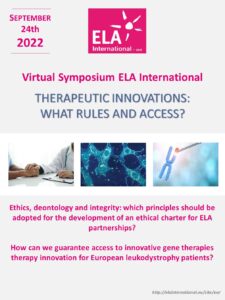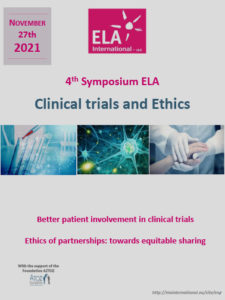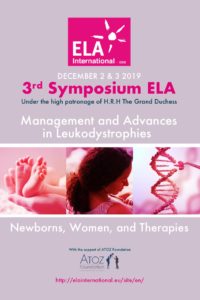ELA International organized a virtual symposium on Saturday, September 24, 2022

Therapeutic innovation: what ethical rules and what access?
This event is a continuation of a first important event organized in last November on Clinical trials and Ethics.
It brought together medical experts, industrialists, health agencies and families to explore together the concepts of ethics, deontology and integrity and to discuss access to innovative treatments.
Simultaneously translated into five languages (English, French, German, Italian and Spanish), this symposium was once again opened to the families of ELA branches and the international community.
ELA International Virtual Symposium – Saturday 27 November 2021
The patient at the heart of research
 Organised by ELA International, an innovative symposium on “CLINICAL RESEARCH and ETHICS OF CLINICAL STUDIES” brought together experts and families to reflect on how to involve patients and their families in the various research studies that concern them, and on the impact of these trials on patients.
Organised by ELA International, an innovative symposium on “CLINICAL RESEARCH and ETHICS OF CLINICAL STUDIES” brought together experts and families to reflect on how to involve patients and their families in the various research studies that concern them, and on the impact of these trials on patients.
An innovative symposium
The objective of this symposium was to establish the ethical rules that will guide ELA International in its partnerships with both public and private laboratories.
ELA International and its President Guy Alba wanted to organise this symposium in order to bring together all patients to reflect on the ethics that are becoming urgent considering the increasing number of clinical trials for leukodystrophies. This event is part of the continuity of the Family/Researchers meetings organised each year by ELA and underlines once again its desire to be more accessible to the international community of leukodystrophy patients.
The international symposium brought together around 100 people, experts and patients, and no less than 11 nationalities. Simultaneous interpretation into 5 languages (German, English, Spanish, French and Italian) allowed everyone to enjoy the discussions in the language they wanted.
Moderated by Professor Grégoire Moutel (Caen University Hospital), an expert in ethical issues, the symposium focused on two main themes:
- Increasing patient involvement in a research programme
- Ethics of partnerships: benefits for patients
The views of experts involved in clinical trials and the testimonies of families about their experiences as patients were illustrated from two trials, one of gene therapy in children and the other of drug treatment versus placebo in humans.
Clinical trials: information to patients
During the first session, an overview was given of the accessibility of clinical trials for patients through two examples: the gene therapy trial for metachromatic leukodystrophy conducted by the ORCHARD laboratory with Valeria Calbi(Saint Raphael Hospital, Milan, Italy), the chief investigator of the Milan site, and the drug trial in adrenomyeloneuropathy, conducted by the Minoryx laboratory with the chief investigator of the Boston site, Florian Eichler(Massachusetts General Hospital, Boston, USA).
The experts emphasised the importance of involving the patient in the trials, accompanying them through the different stages before they decided whether or not to be included in a trial and moving towards comprehensive family care.
Valeria Calbi described the complexity of implementing a trial and the vast amount of information that needs to be communicated to patients and the multitude of experts involved. Experts know the disease well but do not necessarily have all the answers and should not lose sight of the objective of providing patients with the best possible information. Good coordination of all involved is essential.
Florian Eichler stressed the importance of patient feedback and is working on setting up questionnaires on the patient’s experience after a study, ” the patient must be an active contributor “. These insights are invaluable for the experts and will allow them to better adjust the processes and the approach to be taken to the tests.
The 10-minute presentations by the experts were accompanied by testimonies from families involved in the trials. They were able to recount their experiences, expressing how difficult it is for some of them to access information, and to deal with the cumbersome and lengthy administrative procedures in emergency situations that leave little room for reflection or questioning.
The discussion between the different speakers, moderated by Grégoire Moutel, highlighted the courage of the patients and the need to inform them about the constraints of the trial but also about the benefits it can represent: “Not everything can be communicated, but it is necessary to explain why, transparency is important,” said Grégoire Moutel. He also emphasised the need to produce educational materials, which are just as accessible to the child/patient, and although written legal consent documents are essential, oral information is crucial and should be developed.
Finally, the discussion was opened up more widely to all participants. Questions on the conditions of access to trials, inclusion criteria, access to information, placebo-controlled trial or analysis of results, led to exchanges between experts and families.
On this occasion, Florian Eichler highlighted the complexity of the placebo-controlled trial, while specifying that the placebo element is a benefit for future patients, by making it possible to highlight the efficacy of a molecule and to reduce certain analysis biases. He insisted on the importance of speaking to the patient, which allows the experts to get closer to the facts and to feed their thinking. To develop further, he proposes that think tanks and observation groups be set up to encourage new links between the various research players.
Towards fair sharing
The second session, dealing with the ethical aspects of clinical trials, partnerships and patient outcomes, began with Dr Frederic Sedel speaking about the Biotin trial (MD1003), which was conducted by Medday Pharmaceuticals. The latter recalled ELA’s financial contribution to the trial and the framework of the contractual partnership between the two entities, highlighting the terms of the ” return on investment ” for ELA and its patient community. Thanks to the partnership agreement between the partners, this negative trial in adrenomyeloneuropathy gave rise to the full reimbursement of the sums paid by ELA, following the marketing of the molecule in certain European countries for use in multiple sclerosis. This example clearly shows the importance of the promotion of research and the place it must take in partnership contracts established at a very early stage of research. Guy Alba reminded the audience of the conditions of this type of partnership and ELA’s commitment to reinvest all the sums resulting from this research in the financing of new research projects.
Professor Marjo van der Knaap(Vu University Amsterdam, The Netherlands) presented the Guanabenz trial for CACH syndrome for which she is the Chief Investigator. She was able to highlight the involvement of the families involved at different stages of the study’s development. By mentioning the legal and administrative framework of this trial, she highlighted the difficulty of obtaining the many necessary authorisations from the various medical institutions involved and the obstacles encountered. The potential delay in the implementation of the trial is a real constraint to be considered.
Finally, Bruno Flesselles (Intellectual Property Advisor, Paris, France) gave an update on clinical studies in general, and more particularly on the role of ELA and the actions to be taken as well as the promotion of research results through partnerships.
To be a stakeholder in the development of research, ELA must be involved at a very early stage. To move in this direction, the association has already changed the way it approaches its call for tenders and will continue this work. In the supported clinical trials, ELA is a funder but can also assist in the recruitment and follow-up of patients, notably through its online clinical trial platform, Leuconnect, which brings together a community of patients who volunteer to participate in trials. Bruno Flesselles said that today, ELA should no longer be seen only as a funder but also as a real partner in research.
The outlook
Research involving leukodystrophy patients is on the increase and this reflection on ethics will help to define the framework of the partnerships set up between ELA and clinical research contributors to support tomorrow’s research and strengthen the medical and social support of families.
Guy Alba emphasised the importance of talking to the patient and providing information to families. He highlighted the crucial role of ELA as a partner in a sector that is still not very appealing to industry and highlighted the tools developed by ELA such as the Leuconnect platform to accelerate research into leukodystrophies. Finally, he concludes: “ELA is selflessly managed with a commitment to reinvest all of our partnership funds in leukodystrophy research
With this symposium, ELA is once again at the heart of current research issues and is fuelling the debate by giving families a voice to better understand their goals and experts to better understand their constraints and ambitions.
“This symposium strengthens the collaboration between physician-researchers, patients and families affected by leukodystrophy across the board and creates the strength that is essential for therapeutic progress.”
This event brought together the different points of view of families and researchers and enriched the reflection that could be achieved through workshops.
It has provided a real roadmap for the years to come.
VIDEO OF SYMPOSIUM
World experts on leukodystrophies brought together by ELA International to advance research.

ELA International has brought together about thirty eminent researchers from different countries (United States, Italy, Spain, United Kingdom, Germany, Holland, France,etc.) to enrich their mutual approaches to leukodystrophies (degenerative brain diseases which affect 20 to 40 births per week in Europe), and thus advance research.
The event, placed under the High Patronage of Her Royal Highness the Grand Duchess, was inaugurated by Guy Alba Founder of ELA, President of ELA International, in the presence of the Presidents of ELA Belgium, ELA Spain, ELA Italy, ELA Luxembourg and ELA families associated with the support of the ATOZ Foundation.
Guy Alba recalled the progress made during these 27 years (discovery of new genes, biomarkers, new therapeutic approaches) that researchers can be proud of.
Three priority themes were discussed:
• Neonatal screening for leukodystrophies
• New therapies
• Women with leukodystrophy
At the symposium, ELA International announced the launch of an exceptional call for tenders in spring 2020, funded to the tune of €500,000, for the launch of a clinical trial for women with adrenoleukodystrophy or Pelizaeus-Merzbacher disease. These women, who for a long time were considered to be unaffected by the disease, are now recognised as patients in their own right. However, there is very little information and research about their situation. These women, in addition to being sick, are often mothers to a sick child, and give priority to caring for their child, to the detriment of their own medical care. ELA would like the community of experts to look into their case.
On the occasion of Giving Tuesday, International Donation Day on December 3, ELA launched an appeal for generosity to fund this new clinical trial. We are now at the dawn of/the initial phase of the first treatments thanks to the hopes generated by several initial clinical trials on sick children and adults.
We owe these tremendous advances to our donors, as ELA finances all its actions exclusively through donations.













